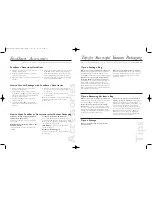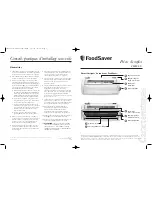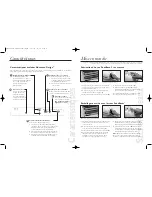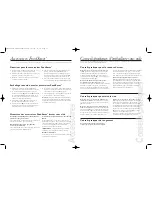
Accessories
FoodSaver
®
Accessory Guidelines
FoodSaver
®
Accessories
Accessories include FoodSaver
®
Vacuum Packaging Canisters, Universal Lids, Jar Sealers and Bottle Stoppers.
1.
Always leave at least one inch (2.5 cm) of space
between contents and rim.
2.
Wipe rim of canister, container or bottle to
ensure it is clean and dry.
3.
Place lid on canister or container, or place stopper
in bottle.
4.
For accessories with a large knob on lid, turn knob
to
Vacuum
. Vacuum package using instructions
below. When vacuum process is complete, turn
knob to
Closed
before removing Accessory Hose.
5.
For accessories without a large knob on lid, vacuum
package using instructions below.
How to Open FoodSaver
®
Accessories after Vacuum Packaging
FoodSaver
®
Vacuum Packaging Canisters
(without large knob on lid)
To release vacuum and open, push gray rubber
button on lid.
Quick Marinators (with large knob on lid)
and Universal Lids
To release vacuum and open, turn knob on lid
to
Open
.
FoodSaver
®
Jar Sealer with Mason Jars
For use with Ball
®
and Kerr
®
brand Mason jars.
To release vacuum and open, wedge spoon between
Mason jar lid and highest part of threaded rim. Twist
spoon gently to release vacuum.
IMPORTANT:
Do NOT use screw bands when
vacuum packaging jars.
FoodSaver
®
Bottle Stoppers
To release vacuum and open, twist and pull up on
Bottle Stopper.
How to Vacuum Package with FoodSaver
®
Accessories
1.
Prepare container according to FoodSaver
®
Accessory Guidelines above.
2.
With lid closed, insert one end of Accessory
Hose
(A)
into Port
(K)
on appliance. Insert other
end into port on accessory. Twist gray tab while
inserting to ensure a tight fit.
3.
Lock the Latch
(D)
on side of appliance
before vacuuming.
4.
Push Canister Button
(M)
to begin vacuum
process. Motor will run until vacuum process is
complete.
5.
When motor turns off, gently twist and remove
Accessory Hose from accessory and appliance.
Unlock Latch.
6.
To test vacuum, simply tug on accessory lid.
It should not move.
Note:
For important tips on using accessories with
different foods, please refer to the
FoodSaver
®
Reference Guide.
Tips on Sealing a Bag
Make sure you’ve securely latched the appliance lid.
When making a bag from a roll, place bag material
on Sealing Strip
(I)
, close lid and make sure to use
the Latch
(D)
to lock lid. Then press Seal Button
(O)
.
Prevent moisture or liquid from being pulled into
the Vacuum Channel or trapped in the seal.
Either
pre-freeze moist food such as raw meat for 1-2 hours
before vacuum packaging, or place a folded paper
towel between food and end of bag to absorb excess
liquids. Just be sure to leave at least 3 inches (7.5 cm)
between paper towel and end of bag so that bag seals
properly with paper towel inside.
Make sure you give appliance time to cool down.
Wait at least 20 seconds between seals. Under very
heavy usage, appliance will not operate to prevent
overheating. If it does, wait 20 minutes to allow
appliance to cool off.
Tips on Removing Air from a Bag
Make sure you’ve securely latched the appliance lid.
When vacuuming and sealing a bag or canister, make
sure the Latch
(D)
is in the locked position.
Check for wrinkles in the bag along the Sealing
Strip
. Wrinkles in seal may cause leakage and allow
air to come back into bag. Check for wrinkles in bag
along Sealing Strip
(I)
before closing lid and vacuum
packaging. If you find wrinkles after sealing bag, simply
cut bag open and vacuum package again.
If motor runs for more than 30 seconds without
stopping, consider the following:
You may need to
adjust bag and try again. If you are making the
initial seal on a piece of bag material with two open
ends, make sure bag is placed on Sealing Strip.
If you are vacuum packaging with a bag, make sure
open end is placed down inside Vacuum Channel
(G)
and make sure Accessory Hose
(A)
is not
attached. If you are vacuum packaging with an
accessory, check Accessory Hose in appliance lid
and in accessory to ensure a tight fit.
Tips on Storage
Always store appliance with the Latch (D) in the
unlocked position.
Tips for Successful Vacuum Packaging
For more usage tips and safety information, please refer to the FoodSaver
®
Reference Guide or visit our website at
www.foodsaver.com
.
Tips
Quick Start Guide V2240-CN.qxd 7/11/07 13:56 Page 4























